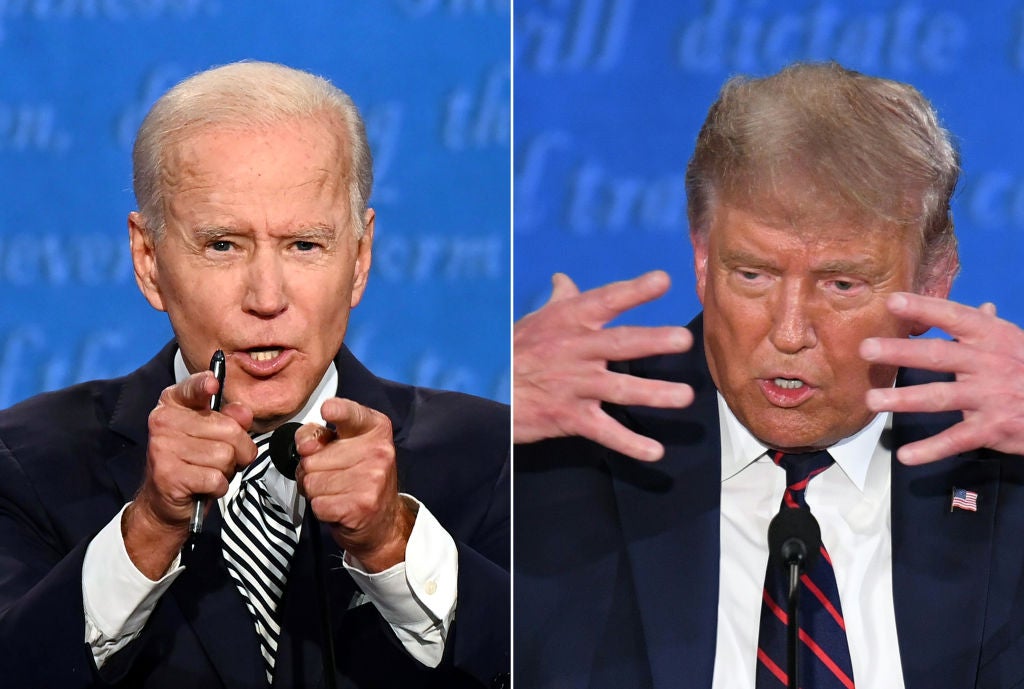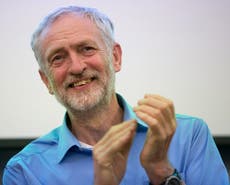Stop complaining about the presidential debate – Trump and Biden showed that US democracy is alive and kicking
Tuesday night’s debate may have been excruciating, but in many ways it exemplified the very essence of American democracy at this particular point in its history, writes Mary Dejevsky


One of the pithiest comments on this week’s televised presidential debate came from the American commentator, Andrew Sullivan, while the ill-tempered duel was still going on. It was, he tweeted, “excruciating in ways I didn’t even know I could be excruciated”. Indeed. The most civil – the only civil – moment came when Donald Trump, and his challenger, Joe Biden, first walked on to the platform and acknowledged each other, without actually yelling or raising their fists.
From then on, it was 90 minutes of almost unwatchable, unlistenable torment, with each man talking over the other – all right, more Trump than Biden – and juvenile insults fouling the air. Even a moderator as experienced as Chris Wallace (of generally Trump-friendly Fox News) was unable to hold the line.
The commission that oversees the debates has now moved to ensure that what happened in Cleveland will not be repeated when the two meet again, in Miami, in two weeks’ time. It is promising changes to the format. There is also a suggestion that future moderators should have a “mute” button so that the rule-breaker can be cut off.
It might be worth pausing at this point, however, and asking whether the blistering encounter on Tuesday night really was the worst presidential debate in living memory. Did it really show US democracy hitting “rock bottom”? Actually, no. Those 90 minutes in Cleveland were “excruciating”, but in many ways they exemplified the very essence of American democracy at this particular point in its history.
Here were the two contenders for the highest office in the land – still the most powerful job on the planet – going at each other with verbal hammer and tongs, the whole shebang being broadcast live and unsanitised for the benefit not just of US voters, but the world. What’s not to like?
And if the present occupant of the White House chooses to conduct himself like a bully, and his opponent feels he has no alternative but to give as good as he gets, are we not watching something that penetrates to the core of these two individuals? In their demeanour and language over that hour and a half, the two nominees told a national and global audience as much about who they are than they had communicated at almost any other time in their long, and very different, careers.
No one could complain that these men were not true to themselves. Which is surely a whole lot better than two candidates who smoothly deflect the questions, preface their answers with insincere compliments and then couch their real sentiments in the deceptive euphemisms known as “spin” – the linguistic sorcery that for nearly two decades blighted political discourse in the UK.
Trump’s debating, like his Twitter pronouncements, may be crude, at times cruel and sometimes wrong. But he leaves you in no doubt what he thinks at that particular moment. That the generally mild-mannered Biden took him on in Cleveland was a plus rather than a minus. American voters should be able to see what their would-be presidents are made of. A live TV debate is hardly the Cuban missile stand-off or the crisis of 9/11, but it can afford more than a glimpse of a leader’s character in a make-or-break situation.
What this debate showed was that American democracy, while not currently conducted in the gentlemanly way that it was when the debates began (with JFK v Nixon in 1960), is alive and kicking. It is polarised, raucous and it can be vicious, as indeed democracies tended to be in their early days. But when Trump said – of nominating a new Supreme Court justice so close to an election – that “we won the election. Elections have consequences", he was right. Brutal, but right. He defended his corner.
Televised debates place two candidates in extreme, gladiatorial, circumstances. They can, though often don’t, provide make-or-break moments. But they almost always offer a window into character and a gauge of a country’s democracy in a way few other campaign set pieces do. Which is why they should be an integral part of national elections everywhere.
Many European countries followed the US example in the 1960s by introducing televised debates for the first time. The practice languished at times until the 2000s, when they came into their own. The 2005 debate between Angela Merkel and then chancellor, Gerhard Schroeder, contributed to her narrow election victory that year. Merkel’s debate with Martin Schultz in the 2017 election reinforced her dominance of German politics, but also showed the breadth of the centrist consensus – there was just not that much policy space between them.
The debate earlier that year for the French presidency between the political newcomer, Emmanuel Macron, and the veteran nationalist, Marine Le Pen, was a classic that deserves to be part of the syllabus for politics students everywhere. In 2002, then president, Jacques Chirac, had refused to debate Le Pen when she won her way into the run-off. Macron chose to take her on; what followed was a forensic ideological duel in which the fundamental differences were laid bare.
It is a big defect of UK electoral life that TV debates have never become a fixture. One common objection is that we are not electing a national leader, but constituency MPs. That may be the constitutional fact, but would the so-called red wall have been breached last year, if Boris Johnson had not been leader of the Conservative Party? In 1997, did people vote for their local MP or for the hope represented by Tony Blair? Or, in the 1980s, without an image of Margaret Thatcher in their mind? Personal politics have long been a fact of life here, too.
But it was not until David Cameron, the PR man, that televised debates were held, and then pretty much abandoned – maybe in part because the very first had shown the power of such contests in catapulting Nick Clegg, the Liberal Democrat, on to the national stage. Since then, debates have been, to put it kindly, optional. The initiative has rested with the broadcasters. Leaders feel no real pressure to take part and we have no independent commission on the US model that would institutionalise them. This ought to change.
The Trump-Biden debate was at once agonisingly unwatchable and riveting. It showed the two contenders for the White House ruthlessly vying for power and American politics in the raw. And there is nothing wrong with that. We could do with rather more such political honesty here.




Join our commenting forum
Join thought-provoking conversations, follow other Independent readers and see their replies
Comments